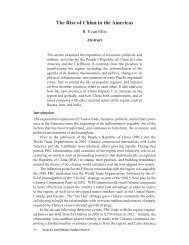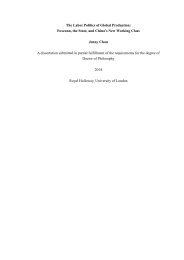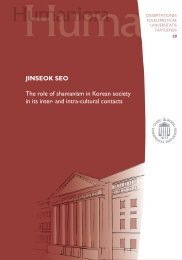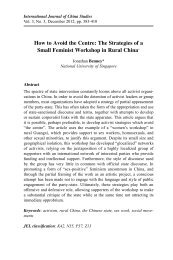Confucius Institutes v2 (1)
Confucius Institutes v2 (1)
Confucius Institutes v2 (1)
Create successful ePaper yourself
Turn your PDF publications into a flip-book with our unique Google optimized e-Paper software.
CONFUCIUS INSTITUTES AND THE GLOBALIZATION OF CHINA’S SOFT POWER 33Authenticating the Nation: <strong>Confucius</strong> <strong>Institutes</strong> and Soft Powerby Jennifer HubbertAt the heart of analytical debates on soft power remains a concernfor semantic security on several levels, defining the constitution ofsoft power and categorizing whether certain soft power activitiesare a means to an end or ends in and of themselves. However, if,as political and cultural analysts, we are to take seriously globalclaims of soft power as an effective or even potential tool of publicdiplomacy, we must not only examine the transnational intentionsof the particular policy formations—what “counts” as soft powerand what are its image-enhancing targets—but also the specificprojects in which these intentions are embedded and enacted. Thus,both methodologically and theoretically, it is key to consider notonly the political visualizations of soft power but also the translocalimaginations and alliances they render both achievable andinconceivable.This paper considers the implications of this claim through anexamination of China’s rapidly expanding <strong>Confucius</strong> <strong>Institutes</strong>(CI) program, one of the nation’s central mechanisms for theconstitution of soft power. 1 CIs are Chinese government-fundedinternational language and culture programs, modeled on Europeanprograms such as Alliance Française and the Cervantes <strong>Institutes</strong>.They are unique in that they are located within existing schoolsand universities, rather than as stand-alone organizations, and aredirectly managed by a branch of the central government. Supportfor the programs includes salaries for the teaching staff from China,curricular materials for students and reference materials for libraries,and cultural exchanges such as kung fu masters and song and dancetroupes. CIs also fund annual conferences in China for Americanschool administrators. This paper will analyze one of these supportprograms, the CI-funded “Chinese Bridge Summer Camp.” Theseare 17-day tours of China for high school students who are learningChinese under the auspices of the <strong>Confucius</strong> <strong>Institutes</strong>. With an eyeto the empirical, this analysis will examine how policy is “peopled” 2on the receiving end of the process. How, I ask, are we to understand






